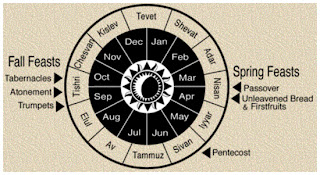Most Christians are probably unaware that today is one
of the most significant holy days on the Jewish calendar, the fast of the fifth
month or often known as “Tish B’Av.”
This fast commemorates 8 national disasters for the Jewish people according to tradition. These disasters happened all on the same
day. Here are some of them. First, the wilderness generation from Exodus
refuse to go into the land and reject God culminating in punishment. They are condemned to die in the wilderness
because they spurned God and refused to believe in Him (Num 14). According to the Jewish calendar, that day happened on Tish B'Av. Second, the first temple was destroyed on
this very day in 586 B.C. by the Babylonians after a long siege. Third, the second temple was destroyed (yup,
you guessed it, on the same day) in 70 A.D. by the Romans. Some others, A Jewish Massacre in 135 A.D.
during the last battle of the Bar Kochba rebellion (which was the result of
Emperor Hadrian building a temple to idols on the Temple Mount and a self proclaimed messiah) and a couple
exiles from countries (England in 1290 and Spain in 1492). What a very sad day indeed and not one by coincidence.
Think about it, what if we had national tragedies that continued
to happen on the same day. Take Dec 7th
or Sept 11th for example.
Just the mere mention of those dates should bring back memories of tragedy. But imagine several distinctive events that
could be attributed to a lack of belief in God.
For Israel, they refused to believe in God and enter into the land and
were condemned. They refused to believe
in God and followed after idols so God's glory left (Ezek 8-11) and the first temple was destroyed (2 Chr
36:11–21). They refused to believe in
God incarnate and were judged with the second temple being destroyed (Matt
23:36-24:2). They followed after a false
Messiah and rebelled against Rome in 135 A.D.
What a day to mourn.
But let’s look at something in a little more detail that
pertains to the “fifth” month of mourning or Tish B'Av.
Take a look at Zechariah 7. The Jewish people
have been exiled and are coming toward the end of this 70 years. Two
representatives come to the priests and prophets to ask about whether they
should weep, mourn and fast during the “fifth” month (Zech 7:1-3). This self-imposed fast was Tish B’Av. At this time, the fast was to remind them of
the First Temple destruction by the Babylonians. The seventh month fast is the “Day of
Atonement” which was commanded by the Lord for them to humble themselves (afflict their souls) over
their sin (Lev 16). Yet their hypocrisy is exposed in that this mourning was
not done for the LORD but for the people themselves (7:5ff). They also had a few more self-imposed
mourning fasts. Take a look at Zechariah
8:19–They observed a fourth month —capture of Jerusalem (city wall breached – 2
Kgs 25:3–4; Jer 39:2) and a tenth month– Siege of Jerusalem (2 Kgns 25:1–2; Jer
39:1) fast. Four fasts in all. The fourth, fifth, tenth month fasts all centered around the loss
of Jerusalem and the Temple. The seventh
month fast focused on their national sin.
But Zechariah 8:19 also points to something else. These mourning fasts will one day turn to
Joy. One day, they will stop mourning
over the devastation their sin has caused. These sorrowful FASTS will turn to
Joyful FEASTS. But don’t stop
there. Keep reading! Zechariah 8:20–23, the peoples of the world
will one day go up to Jerusalem to worship the Lord. Not only that, but the Jewish people will one
day play a part in World Wide Worship. Zechariah 8:13 shows that the Jewish people who are a curse among the nations will one day be saved and will be a source of blessing to the nations. One writer
states, “With the Davidic kingdom established, Israel will be a medium of
blessing to the entire globe.”
Today, all over the world, Jewish people who observe Tish
B’Av will be saying, “Next Year in Jerusalem” in hopes of seeing a restored
nation and temple with Messiah ruling.
After the meal that ends the fast, a common saying is maybe “we won’t have to fast this year.”
Maybe “Messiah will come and the Temple will be rebuilt before the fast starts.”
One day, the LORD will send His Messiah a SECOND TIME, and
they will look on whom they have pierced and mourn – Zechariah 12:10!!! Until that day, Tish B’Av will be a day of
mourning for the Temple. After that day,
there will be joyfilled feast for God’s people will have come to faith in
Christ.



